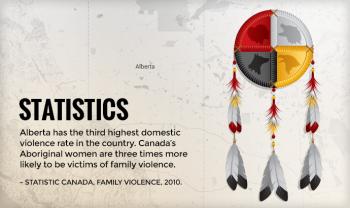Audio
By Brittney Pastion of CFWE-FM
Windspeaker.com Contributor
Alarm has been raised by Greyhound’s announcement July 9 that it will end bus service for passengers and freight in Alberta, Saskatchewan and Manitoba, and the majority of its routes in B.C. as of Oct. 31.
Greyhound has said the routes that will effect rural communities are just not financially sustainable, and have experienced a drop of revenues of 41 per cent since 2010.
Two million customers will be affected, and Greyhound’s decision does not bode well for Indigenous women and children, said Josie Napinak, the executive director of Awo Taan Native Women’s Shelter located in Calgary.
Greyhound’s decision reduces the choices that Indigenous women will have with respect to their safety and ability to flee from violence. It means that Indigenous women “will be placed at greater risk,” Napinak asserts.
“Accessing resources, whether they are financial or transportation is a struggle...” and increases the danger Indigenous women may face when needing to get away from an abuser.
“It means that they may take more risks with respect to perhaps hitchhiking,” said Napinak. “We know the story of the Highway of Tears in northern B.C…. I believe at risk are the lives of Indigenous women, the lives of their children, their well-being.”
Greyhound has been the most affordable mode of transportation option for Indigenous people to visit family across the province, for getting to doctors’ appointments, and often the only transportation service option in rural, remote, and northern communities across western Canada.
“I worry. I’m very concerned… Lack of resources will lead to perhaps death… We have to be realistic about this happening.”
The woman’s shelter has in the past had a contract with Greyhound for its services. Awo Taan was able to provide some funds so that women who call the shelter and want to attend the shelter will arrive safely.
When Awo Taan is aware of a woman hitchhiking to the shelter, they go out to look for her. Napinak says “this will put more pressure on the resources (or the lack of resources that currently exist) in terms of support services for Indigenous women fleeing violence.”
The National Inquiry on Missing and Murdered Indigenous Women and Girls released a statement today confirming Napinak’s concerns.
Public transportation has been a topic of high interest during Community Hearings, reads the statement. Many family members and survivors spoke to the National Inquiry about the fact that many Indigenous women, girls, and 2SLGBTQ people were forced to hitchhike due to the lack of public transportation.
In Smithers, the National Inquiry heard that for over a decade, communities along the infamous Highway of Tears in northern British Columbia fought for a bus or shuttle service. In Saskatoon, the inquiry heard about how the closure of the Saskatchewan Transit Company (STC) was affecting Indigenous communities.
“The recent cuts to Greyhound routes throughout the western provinces will exacerbate the risk and vulnerability of Indigenous women and girls,” says the inquiry.
It calls on all levels of government, federal, provincial and Indigenous, to step in and provide solutions “on this urgent matter”.

